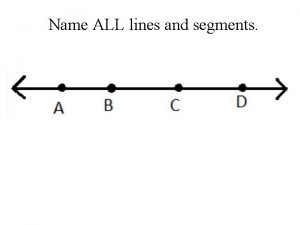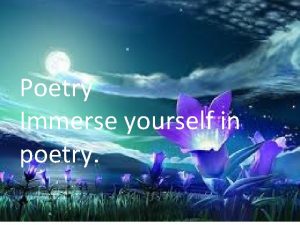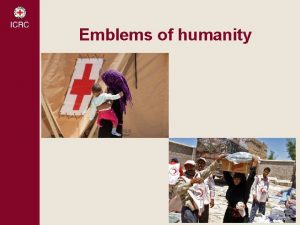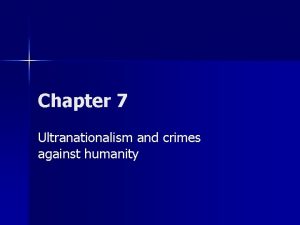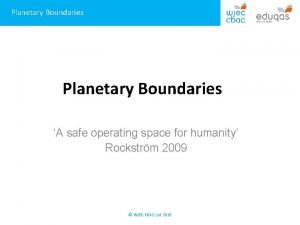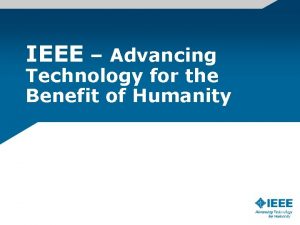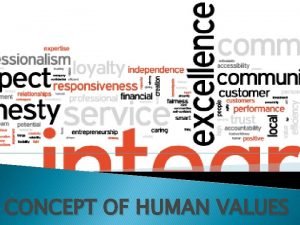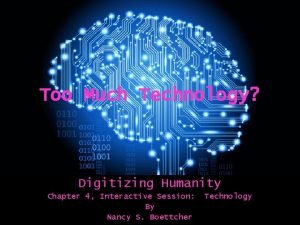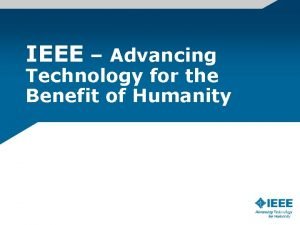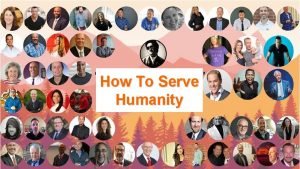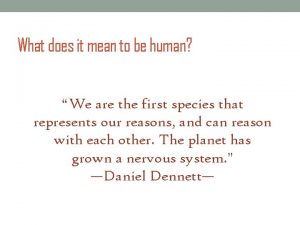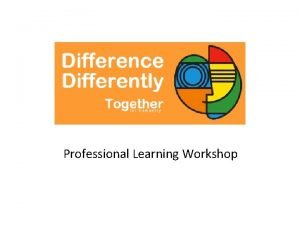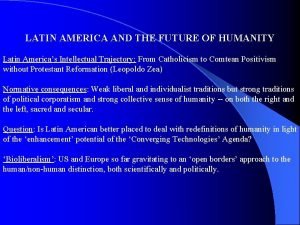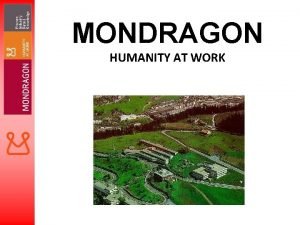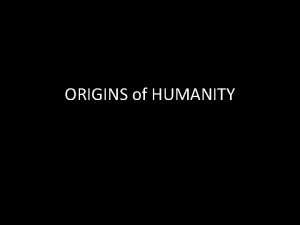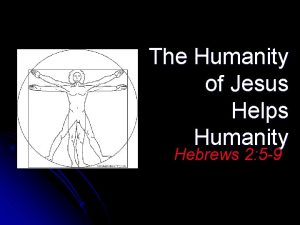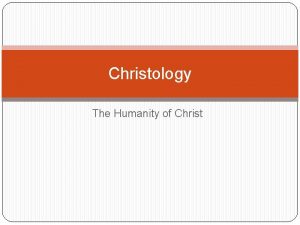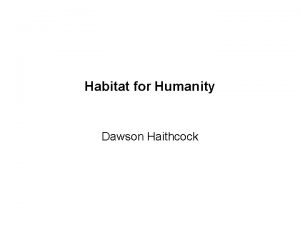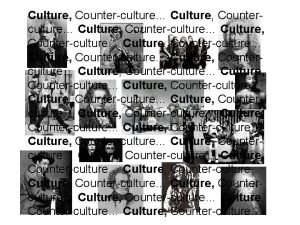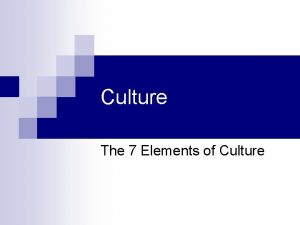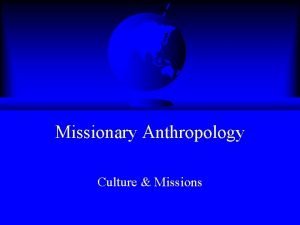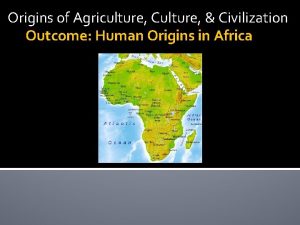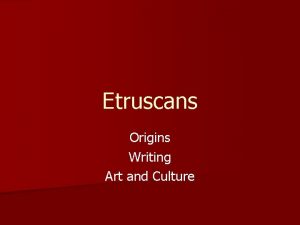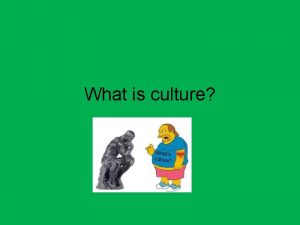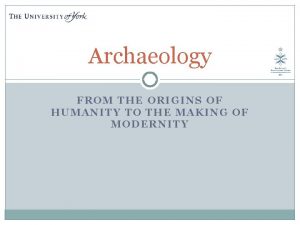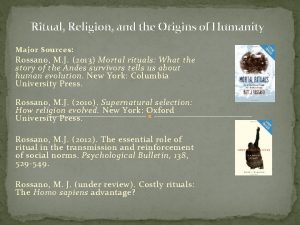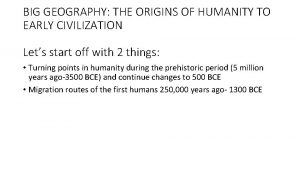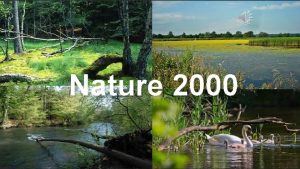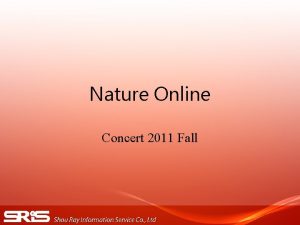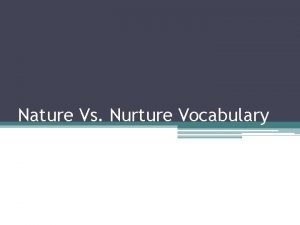Nature Culture Origins of Humanity Why all this























- Slides: 23

Nature & Culture Origins of Humanity

Why all this stuff? n What determines human behaviour? n Q 1: Nature (Biology) or Nurture (society) n Q 2: Society: economics, politics, culture

How Are We Unique? Uniqueness of Humanity needs to be established first n Biology: we physically differ from the animals ---OR---n Society or Cultural view: we don't differ from the animals physically – only in terms of our culture n

Some Differences from Animals n n Ability to Talk (and later write) Extensive use of tools (later sophisticated) Spread over entire earth, not just small range Cultural variation between places

n n n Ability for Art, Music Consciousness, or 'inner voice' Innovation and progress in culture Morality and religion Darker attributes: genocide, drug addiction, environmental degradation

Evolution Mutation in structure gives advantage (ie sharp teeth) ---OR --n Change in environment favours some structural trait (ie ability to store food as fat) n Those with a favoured trait drive others out of habitat or expand to new habitats n

Tracing Evolution - Scientific Advances n Paleontology – fossils, bones n Archaeology- tools, pottery, coins n Molecular Biology – DNA – (population genetics, genetic anthropology)

DNA and Genetic Anthropology n n DNA Discovered in 1970 Sequencing of Human Genome, c. 2000 DNA evidence – compare genetic structure between humans and non-humans to determine closeness Match DNA evidence with fossil record and archaeology (and history) to date mutations

Small Differences, Big Consequences n n Small change in one gene can have big consequences Tay-Sachs disease: drooling, misshapen head, etc. Much of our 1. 6 % DNA differences from Chimps consists of genetic 'junk' Probably just a very small number of genes that make a huge difference

Humans are Primates, Chimps are Humans n n n Primates like apes, monkeys, etc We share over 98 % of our genes with the two other species of Chimp: pygmy chimp and common chimp 1. 6 % diff between us and pygmy chimps Chimps closer to us than to gorillas We can all be considered part of same Chimp family

When did we become 'we'? Match DNA evidence with fossil record and archaeology (and history) to date mutations n Physical evolution not enough: n Mismatch to a large degree between physical changes and cultural innovations, which took thousands of years n Recent acceleration of cultural change n

5 Physical Evolution 5 4 4 3 2 1 1 3 2 Key Stages 1. 6 -8 million yrs 2. 1. 7 m 3. 500, 000 4. 60 -100, 000 5. 40, 000

Quick Evolutionary Succession n n Neanderthals (170 k to 40 k) quickly wiped out by modern Cro-Magnon Humans c. 40 k years ago No evidence of interbreeding Physical unattractiveness and biological incompatibilities Some dispute: see preservation of certain traits, esp in Indonesia and Australia

Physical Differences between Modern and Apelike Humans n n Increase in Brain Size Skeletal Changes enable Walking Upright Decrease in skull thickness, tooth size and jaw muscles Ability to verbalise sophisticated sounds through adaptations of voice box, larynx, tongue

Verbal Ability Leads to: n n n Exponential increase in communication as you add vowels and consonants Thousands of years leads to sentence structure, vocabulary, tenses Allows planning, abstract thinking, technological change, oral tradition ('knowledge') and passing down of techniques

Verbal Ability Leads to: n n n More sophisticated communication of emotion, intimacy 'Inner voice' or consciousness (Mc. Crone) Religion and religious explanation of human existence Morality History-telling and cultural identity vis a vis other groups **'Human Nature'

When Did We Become Human? n n n Pygmy chimps have strong bonds between men and women (ie proto-marriage) and not just between men Neanderthals cared for sick and aged as evidenced by remains of sick or old Early Man after 40, 000 yrs ago engages in murder at much higher rate than today even accounting for world wars

Implications I: Nature or Nurture n n Nationalism: Theory of Collective Nepotism Religion: Evolutionary Predisposition to Religion, found in Twin Studies Economics: 'Selfish Gene'? Mate Selection: Hourglass figure, women are becoming more beautiful with each generation


Does Biology and Evolution Still Matter? n n Is evolution still occurring? (AIDS, malaria, etc) Is all the action now in culture – and is biology now passive? Can biological impulses be 'tricked'? Does this mean that biology no longer matters

Biotechnology and Evolution n n Can we remake or design our genetics and thus control biological evolution? Is this the final assertion of Culture over Biology?

Nature Will Always Count n n n Ultimately we will always be constituted by genes and biology even if we engineer it Unclear how much weight to give to genes as opposed to environment of culture and institutions Interaction between the two makes it extremely difficult to specify cancer, much less the much more complex arena of social behaviour

Ethics n n Are the sets of feelings and needs we gained through evolution the best ones? Should we tinker with our human nature?
 Why why why why
Why why why why How do the origins of folk and popular culture differ?
How do the origins of folk and popular culture differ? Diffusion of folk culture
Diffusion of folk culture What are your impressions of beowulf explain
What are your impressions of beowulf explain Draw three noncollinear points j k and l
Draw three noncollinear points j k and l Dont ask why why why
Dont ask why why why Mondays child poem
Mondays child poem What are emblems?
What are emblems? How does ultranationalism lead to crimes against humanity
How does ultranationalism lead to crimes against humanity A safe operating space for humanity
A safe operating space for humanity Ieee advancing technology for humanity
Ieee advancing technology for humanity Concept of values
Concept of values Humanity chapter 4
Humanity chapter 4 Habitat for humanity restore yakima
Habitat for humanity restore yakima Advancing technology for humanity
Advancing technology for humanity How to serve humanity
How to serve humanity About humanity
About humanity Together for humanity
Together for humanity Humanity in latin
Humanity in latin Humanity paragraph
Humanity paragraph Gods plan for humanity
Gods plan for humanity Habitat for humanity poland
Habitat for humanity poland Shepherding humanity
Shepherding humanity Mondragon humanity at work
Mondragon humanity at work




